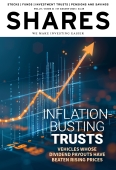Archived article
Please note that tax, investment, pension and ISA rules can change and the information and any views contained in this article may now be inaccurate.
Finsbury Growth & Income versus Temple Bar

Close scrutiny of the AIC’s (Association of Investment Companies) UK Equity Income sector shows two trusts with strong retail followings occupying top and bottom spots in the five-year share price total return performance table, namely Temple Bar (TMPL) and Finsbury Growth & Income (FGT).
In what represents a reversal of fortunes for two popular portfolios, the value-oriented former has returned almost 180% at the time of writing whereas the latter, managed by Nick Train with a quality-growth philosophy and ‘buy-and-hold’ approach, has delivered a comparatively dull 25%.
In NAV (net asset value) total return terms, Temple Bar is up 145.9% and 110% over five and 10 years respectively, ahead of the sector’s 78.9% and 101.2%, whereas Finsbury Growth & Income has lagged the sector over five years with a 35% return, though it is ahead of the sector over 10 years with a 113.2% haul.
HEADWINDS & TAILWINDS
Sector bedfellows they may be, but each trust pursues a distinct style in its quest to deliver their shareholders market-beating total returns (capital growth plus dividends).
Veteran money manager Train has steered Finsbury Growth & Income for a quarter of a century with a successful strategy of long-term investment in high-quality companies with durable and cash generative franchises.
More recent periods have been frustrating for shareholders in the charismatic stockpicker’s low turnover portfolio, which aims to beat the FTSE All Share’s total return, with a high interest rate environment and rotation into value and cyclical UK stocks generating headwinds to his approach, and leaving the shares languishing on a near-8% NAV discount.
As such, there is pressure on Train to turn Finsbury Growth & Income’s performance round, and the board has proactively penciled in a continuation vote for early 2026.
Meanwhile, Redwheel’s Ian Lance and Nick Purves have done a terrific job in reviving Temple Bar’s fortunes since being appointed to run the fund in late 2020, and the shares trade on a modest 0.6% NAV premium as a result.
Value specialist Temple Bar aims to provide growth in income and capital to achieve a long-term total return greater than its FTSE All-Share benchmark, and the investment focus is primarily on UK shares, mainly selected from the FTSE 350.
Temple Bar has delivered outperformance by sticking to the managers’ philosophy rooted in value investing. Lance and Purves scour the UK market for unloved companies with a credible path to recovery, rather than buying beaten-up stocks in structural decline or lacking turnaround potential.
To avoid ‘value traps’, they aim to identify good quality companies which are undervalued and place great emphasis on strong cash flows and robust balance sheets. This gives them confidence a company can survive through a prolonged spell of lower profitability, either due to company specific issues or an economic downturn.
Finsbury Growth & Income is the more concentrated of the two by some stretch. As of 30 June, its top 10 holdings accounted for the thick end of 90% of the portfolio, compared with a top 10 representing 43.7% of the total at Temple Bar.
Train’s trust had 21 high-conviction holdings, an active share of 84.9% and an ongoing charge ratio of 0.6%, whereas quarterly dividend-payer Temple Bar was more diversified across 36 holdings, and ongoing charges were similar at 0.61%.
Both portfolios have allocations to the Consumer and Financial sectors, although Temple Bar has benefited from exposure to more ‘old economy’ value sectors, such as Energy and Materials, whereas Finsbury Growth & Income has greater exposure to Consumer Staples, Industrials and Technology.
Temple Bar has also adopted a new dividend policy which reflects the increasingly important role of share buybacks in returns. Future dividends will be enhanced to reflect a portion of the buybacks of those companies held by the trust.
THE MANAGERS HAVE THEIR SAY
Ian Lance tells Shares: ‘In the nearly five years since we took over the management of Temple Bar the shares have produced a total return of 187% versus 83% for the UK market (Source: Bloomberg, 30 October 2020 to 22 July 2025). Four stocks – NatWest (NWG), Marks and Spencer (MKS), Centrica (CNA) and Standard Chartered (STAN) – are responsible for half of that outperformance with positive contributions also coming from BP (BP.), Shell (SHEL) and Barclays (BARC).’
Lance says the common theme among all these stocks is the incredibly low starting valuation which existed in the summer of 2020 when he and Purves were transitioning the portfolio.
‘It is easy to forget that we were in the middle of the first lockdown, and such was the level of fear among investors some shares were driven to irrationally low levels,’ recalls Lance.
‘This was best exemplified by the fact NatWest traded at the same price in 2020 that it reached in 2008 when the UK government had to bail it out even though it was a substantially stronger and higher-quality business. The share price has increased by 400% from that 2020 low to today.’
He continues: ‘Fears the economy would never recover meant the oil price briefly went negative which drove down the share prices of energy stocks to levels which implied profits would never recover. The moral of the story is that sticking with a disciplined valuation-driven investment process can produce the greatest reward during a period when fear and uncertainty lead to completely irrational valuations and throw up the greatest opportunities.’
Nick Train tells Shares: I have been responsible for Finsbury Growth & Income Trust’s investment affairs for 25 years and I am still proud of the long-term track record.
‘However, the last few years have disappointed. In truth, the last five years were always going to be an uphill struggle for an investment approach which tends to avoid Energy, Banks and Defence, which have all performed well. That only tells part of the story though. In hindsight, the portfolio has had insufficient exposure to companies whose services are becoming more relevant as we get deeper into the 21st century. Specifically, not enough in “Digital Winners”: Data, Software and Technology Platform companies. It has been our work over the last three years to rectify that, and today our exposure to Digital Winners stands at over 60%.’
Train continues: ‘Now, perhaps more than ever, I am excited about the prospects for Finsbury Growth & Income’s portfolio, comprised of companies with multi-decade growth opportunities at more than reasonable valuations in my view.’
Train, who has raised his personal stake in the trust this year, is not surprised that claim is sometimes met with scepticism, ‘particularly when I tell you these companies with multi-decade growth opportunities are all UK-listed. There is an erroneous assumption the UK stock market is bereft of growth companies, particularly digital growth companies. Not so. The UK stock market houses several substantive, world-class digital businesses and Finsbury Growth & Income’s portfolio is built around them. We expect the growth rates of of the trust’s major holdings to accelerate in coming years, as technology helps them create new services for customers and new wealth for shareholders. The best investments are often a surprise, and we believe investors will be surprised at the growth opportunities to be found in the UK, and the market and Finsbury Growth & Income will perform better as that realisation sinks in.’
PRIMED FOR PERFORMANCE
While Finsbury Growth & Income lagged the index over the second quarter of this year, there were standout performers including property portal Rightmove and a trio of British brands or franchises, luxury fashion house Burberry (BRBY), premium mixer drinks firm Fevertree (FEVR:AIM) and football giant Manchester United (MANU:NYSE), a trio with global recognition and globally-derived revenues.
Train recently initiated a new holding in another company which controls formidable data sets, namely automotive online marketplace Autotrader (AUTO). ‘Frankly we should have been invested in this company years ago, because we have long understood the attractions of companies with dominant positions in classified advertising and it is truly impressive that Autotrader attracts an audience 10 times the size of its nearest rivals,’ explains Train in Finsbury Growth & Income’s latest factsheet.
‘However, better late than never, and some investor quibbles with the current state of the used-car market and the cadence of Autotrader’s introduction of its latest suite of car-retailer services have arguably crimped the rating of the shares and presented an opportunity to initiate, which we have taken.’
As for Temple Bar, it outperformed the FTSE All-Share Index in June, with Capita (CPI) rising strongly after the outsourcer reiterated full-year guidance and two new holdings made positive contributions, namely Hana Financial (086790:KRX) and Woori Financial (316140:KRX). Purves and Lance view these two Korean lenders as ‘well-run, shareholder-focused and well-capitalised banks which are attractively valued’ and point out both have benefited from government initiatives designed to improve corporate valuations.
But it wasn’t all plain sailing for Temple Bar, which saw a disappointing showing from advertising giant WPP (WPP) following a report Meta (META:NASDAQ) was planning to enable brands to fully create and target ads using AI by the end of next year, heightening concerns the technology will take business from WPP.
GSK (GSK) fell on concerns following a headline the US Secretary of Health was weighing a review of vaccines containing aluminium, an ingredient in some of its vaccines, while Pearson (PSON) weakened after competitor IDP Education (IEL:ASX) warned the international student market continues to be hit by global policy uncertainty.
‘UK equities continue to be valued at a significant discount to global equities generally,’ observe the Redwheel duo in the latest Temple Bar factsheet. ‘Accordingly, we believe notwithstanding the shorter-term uncertainties, UK equities are priced to offer relatively attractive returns into the future.’
Important information:
These articles are provided by Shares magazine which is published by AJ Bell Media, a part of AJ Bell. Shares is not written by AJ Bell.
Shares is provided for your general information and use and is not a personal recommendation to invest. It is not intended to be relied upon by you in making or not making any investment decisions. The investments referred to in these articles will not be suitable for all investors. If in doubt please seek appropriate independent financial advice.
Investors acting on the information in these articles do so at their own risk and AJ Bell Media and its staff do not accept liability for losses suffered by investors as a result of their investment decisions.
Issue contents
Editor's View
Feature
Great Ideas
Investment Trusts
News
- Profit warning sends shares in STV Group spiraling lower
- Surprisingly weak US jobs data and new tariff threats lead to market turbulence
- Investors seize on positive signs at Diageo despite profit slump
- Optimism quietly growing around Cisco prospects
- Venture capital backed Figma completes blowout New York IPO
 magazine
magazine








